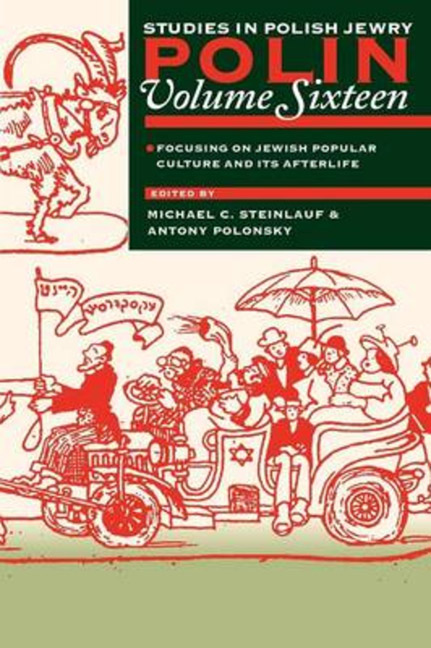Book contents
- Frontmatter
- Dedication
- Editors and Advisers
- Preface
- Polin
- Polin: Studies in Polish Jewry
- Contents
- Note on Place Names
- Note on Transliteration
- PART I JEWISH POPULAR CULTURE IN POLAND AND ITS AFTERLIFE
- IN PRE-WAR POLAND
- AFTERLIFE
- PART II DOCUMENTS
- PART III NEW VIEWS
- PART IV REVIEWS
- REVIEW ESSAYS
- BOOK REVIEWS
- Hillel J. Kieval, Languages of Community: The Jewish Experience in the Czech Lands
- Jacob Goldberg, Haḥevrah hayehudit bemamlekhet polin-lita
- Kristi Groberg and Avraham Greenbaum (eds.), A Missionary for History: Essays in Honor of Simon Dubnow
- Israel Kleiner, From Nationalism to Universalism: Vladimir Zéev Jabotinsky and the Ukrainian Question
- Konrad Zieliński, Żydzi Lubelszczyzny 1914–1918
- Jerzy Malinowski, Malarstwo i rzeźba Żydów polskich w XIX i XX wieku
- Kadya Molodowsky, Paper Bridges: Selected Poems of Kadya Molodowsky, ed. and trans. Kathryn Hellerstein
- Julian Tuwim, Utwory nieznane. Ze zbiorów Tomasza Niewodniczań skiego w Bitburgu: Wiersze, Kabaret, Artykuły, Listy, ed. Tadeusz Januszewski
- Stanisław Wielanek, Szlagiery starej Warszawy: Śpiewnik andrusowski
- Stanisław Wielanek, Party na Nalewkach
- Jan Tomasz Gross, Sa˛siedzi: Historia zagłady z.ydowskiego miasteczka
- Burning Questions: A Film by Mishael Porembski
- Martin Dean, Collaboration during the Holocaust: Crimes of the Local Police in Belorussia and Ukraine, 1941–44
- Jerzy Tomaszewski (ed.), Studia z dziejów i kultury Żydów w Polsce po 1945 roku
- Dagmar C. G. Lorenz (ed.), Contemporary Jewish Writing in Austria: An Anthology
- Romuald Jakub Weksler-Waszkinel, Błogosławiony Bóg Izraela
- CORRESPONDENCE
- OBITUARIES
- Notes on the Contributors
- Glossary
- Index
Jacob Goldberg, Haḥevrah hayehudit bemamlekhet polin-lita
from BOOK REVIEWS
- Frontmatter
- Dedication
- Editors and Advisers
- Preface
- Polin
- Polin: Studies in Polish Jewry
- Contents
- Note on Place Names
- Note on Transliteration
- PART I JEWISH POPULAR CULTURE IN POLAND AND ITS AFTERLIFE
- IN PRE-WAR POLAND
- AFTERLIFE
- PART II DOCUMENTS
- PART III NEW VIEWS
- PART IV REVIEWS
- REVIEW ESSAYS
- BOOK REVIEWS
- Hillel J. Kieval, Languages of Community: The Jewish Experience in the Czech Lands
- Jacob Goldberg, Haḥevrah hayehudit bemamlekhet polin-lita
- Kristi Groberg and Avraham Greenbaum (eds.), A Missionary for History: Essays in Honor of Simon Dubnow
- Israel Kleiner, From Nationalism to Universalism: Vladimir Zéev Jabotinsky and the Ukrainian Question
- Konrad Zieliński, Żydzi Lubelszczyzny 1914–1918
- Jerzy Malinowski, Malarstwo i rzeźba Żydów polskich w XIX i XX wieku
- Kadya Molodowsky, Paper Bridges: Selected Poems of Kadya Molodowsky, ed. and trans. Kathryn Hellerstein
- Julian Tuwim, Utwory nieznane. Ze zbiorów Tomasza Niewodniczań skiego w Bitburgu: Wiersze, Kabaret, Artykuły, Listy, ed. Tadeusz Januszewski
- Stanisław Wielanek, Szlagiery starej Warszawy: Śpiewnik andrusowski
- Stanisław Wielanek, Party na Nalewkach
- Jan Tomasz Gross, Sa˛siedzi: Historia zagłady z.ydowskiego miasteczka
- Burning Questions: A Film by Mishael Porembski
- Martin Dean, Collaboration during the Holocaust: Crimes of the Local Police in Belorussia and Ukraine, 1941–44
- Jerzy Tomaszewski (ed.), Studia z dziejów i kultury Żydów w Polsce po 1945 roku
- Dagmar C. G. Lorenz (ed.), Contemporary Jewish Writing in Austria: An Anthology
- Romuald Jakub Weksler-Waszkinel, Błogosławiony Bóg Izraela
- CORRESPONDENCE
- OBITUARIES
- Notes on the Contributors
- Glossary
- Index
Summary
The latest book by Professor Jacob Goldberg, an outstanding scholar who focuses on the history of Jews in the Polish–Lithuanian Commonwealth in the early modern period, consists of fourteen articles. The articles were published in various periodicals and collective works, mostly in Polish, with some in English and German (a list of the original titles and places of publication is included). The texts are translated into Hebrew. The book contains an index of persons and an index of places; place names are given in both Hebrew and Polish.
The great value of this book is that it collects in one volume texts that are widely dispersed and (for linguistic reasons) inaccessible and makes them available to Israeli scholars and students interested in the history of Jews in old Poland. The texts illustrate many important aspects of Jewish life in the Polish–Lithuanian Commonwealth.
The book contains the following articles:
‘The Attitude of Polish Society towards Jews’. The author examines the image of the Jew in Polish society, anti-Jewish literature, the policy of the Catholic Church towards Jews, and ritual accusations against them (above all, the blood libel). The various subgroups within Polish society—noblemen, peasants, and townspeople— differed in their attitude towards Jews, and the transformation of Polish society in the eighteenth century brought about a change in attitude towards them. The demographic factor—that is, the fact that the Jews constituted 10 per cent of the population—determined Polish attitudes towards the Jews to a much greater extent than it had before and influenced ideas for Jewish reform at the time of the Four-Year Sejm.
‘De non tolerandis Iudaeis’. Anti-Jewish regulations in Polish towns and the struggle against them—the case of Wielun´ in the sixteenth to nineteenth centuries. The author discusses rights of de non tolerandis Iudaeis granted to Polish towns (Wielun´ was granted the right in 1566). When a town obtained this right, it did not mean that all Jews were expelled; often they continued to live on the private properties of noblemen in the town (jurydyki) and in other properties excluded from municipal authority. In towns which had been granted this right, it was also possible for Jewish merchants to conduct limited trade.
- Type
- Chapter
- Information
- Focusing on Jewish Popular Culture and Its Afterlife , pp. 507 - 511Publisher: Liverpool University PressPrint publication year: 2003



